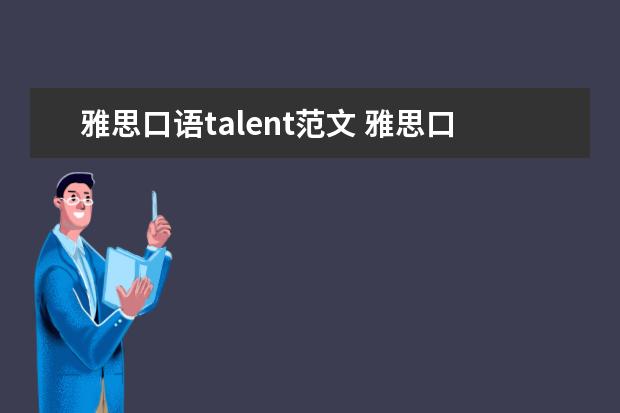当前城市:淄博[切换]
- 手机雅思无忧

扫码登录
雅思考试主要是通过对考生听、说、读、写四个方面英语能力的考核,综合测评考生的英语沟通运用能力,实现“沟通为本”的考试理念。对于雅思考生来说,也有很多考试难点和政策盲区需要帮助解答。今天雅思无忧网小编准备了雅思口语talent范文 雅思口语范文赏析:aquizTVshow,希望通过文章来解决雅思考生这方面的疑难问题,敬请关注。
环球教育老师为同学们总结5个雅思口语谚语的用法及详细意思解说如下,希望对您的备考有所帮助~
雅思口语谚语的用法及详细意思解说
1、ONE-TRICK PONY
Meaning: A pony is a *all horse, which is often used for shows, competitions, and exhibitions. People teach ponies “tricks” to perform at the shows. If a pony only knows one trick, then it doesn’t have a great variety of abilities. So describing someone as a “one-trick pony” means the person has only one ability or good quality that he/she is known for, and doesn’t have any other abilities.
只会一招的小马,就是形容一个人只有一个能力或者一个好的品质被大家知道,其实也没别的真没事。用中文的成语解释就是“黔驴技穷”。
2、WEASEL OUT OF SOMETHING
Meaning: Weasels have a reputation for being sneaky. If a person ' weasels out of' some responsibility, it means they abandon their responsibility or commitment in a way that is sneaky or cowardly.
形容一个人会推诿、退出(做某事),逃避(责任)。
3、THE LION' S SHARE
Meaning:“The lion' s share” of something is the biggest part or portion.
字面意思是狮子的那一份儿,引申为最大最多的那一份儿,最大的份额。
4、HOLD YOUR HORSES!
Meaning:This idiomatic expression means “Wait a minute! Don’t be in such a hurry.”
等我一会儿,别着急。
5、PIG-HEADED
Meaning:Describing someone as “pig-headed” means that person is stupid and stubborn (close-minded and inflexible).
就是形容一个人很蠢,很顽固。
不知道以上内容能否对您的雅思备考有些许帮助,如有雅思备考相关问题可以随时在线咨询我们的环球教育老师~~第一时间为您制定计划解答疑问,希望同学们都可以取得理想的雅思分数~
环球教育秉持教育成就未来的理念,专注于闹首为中国学子提供优质的出国语言培训及配套服务。环球蔽陪教育在教学中采用“液并数九步闭环法”,帮助学生快速提升学习效能,同时提供优质的课后服务,跟进学生学习进程,为优质教学提供坚强的保障。目前,环球教育北京学校已构建了包含语言培训、出国咨询、国际课程、游学考察、在线课程等在内的一站式服务教育生态圈。相关问题可在线免费咨询,或拨打免费热线400-616-8800~~
雅思口语part2备考一直是众多考鸭们的头等难事,不敢开口,开口说不出,说不地道,相关正旅话题的经历太少,让人抓狂。下面我喊清友给大家带来雅思口语 范文 赏析:a quiz TV show,希望对大家的口语有帮助!
雅思口语范文赏析:a quiz TV show
Describe a quiz TV showWell, it seems that many TV channels like to present some quiz shows to the public, such as “the lucky 52” in CCTV2, “happy dictionary” in CCTV 3, and “great competition of intelligence” in CCTV 1. But here, I’d like to talk about a quiz show from Shenzhen TV channel, which is named as “who is cleverer”.
This quiz show brings the *s back to the primary school class, helps them recall those happy memories in the childhood, recollects those forgotten knowledge. It aims to attract audience of primary school students, as well as *s.
In this quiz show, a group of primary school students and a team of *s are competing on the same stage, for those seemingly familiar and seemingly simple questions from primary school subjects. It is fun to see the embarras*ent of those * compe*s unable to answer those easy questions, and it is also fun to see those primary students showing off their knowledge in front of their * compe*s. Altogether, there are 10 questions for each compe*, and those *s who can answer right all the 10 questions may have a chance to get the prize: 50 thousand YMB , but if he fail, he has to say to the audience, “wow, I am not so clever as a primary school student” and then he is replaced by another *s.
Wow, it’s so funny that after so many years education, almost no *s could win the game and get the prize. And it’s so interesting that this quiz show can bring so many parents and children in front of their TV sets to enjoy their get-together. I like the feeling of watching this kind of TV programs.
雅思郑槐口语Part 2话题:A Show or a Performance
雅思口语Part 2话题参考答案
Describe a show or performance
You should say:
what kind of performance it was
when and where you saw it
how it was performed
and explain how you felt about this performance.
My friends and I visited Laoshe Teahouse in Beijing last summer. It was our first time to visit such a famous place. We not only had nice tea but also enjoyed Chinese traditional art performances. It has been quite an impressive experience to me, and to my friends, too.
The teahouse is to the southwest of Tian’an Men Square. Its amazing Beijing style has attracted hundreds of visitors from home and abroad every day.
Before we decided to go, we had heard a lot about that place and we got very excited. We got even more excited when the performance was about to begin-audience from different parts of the world made the atmosphere hot. The performance began with a thrilling starting music. It was folk music played with Chinese traditional instruments. by Teahouse Music Band. The drum beats immediately dragged people’s attention. After starting music was Peking Opera Highlights with the name Presents from Magu. I didn’t quite follow its plot because I didn’t understand their singing. However, I like the music and the way it was presented. The most unforgettable show came when an artist from Sichuan started performing Face-Changing of Sichuan Opera. It was just like magic. He changed his face so quickly that no one could tell how he could manage that. This show gained much applause from the audience.
I am glad that I took my friends from the US to the Laoshe Teahouse that evening. We had wonderful time there. I like this kind of performance. It has become a special showcase of the essence of Chinese national culture, and a bridge connecting China with the rest of the world.
Part 3
Artistic Performances
1. Are traditional art forms performed very much in China?
In some *all cities and towns, where popular modern art is less introduced into, traditional art forms are still playing an important role in entertaining local people. In big cities, like Beijing and Shanghai, traditional art forms are kept well and performed a lot in big and *all theatres. I think people are getting more aware of protecting our own traditions, including traditional art performances. And this is why it’s now a fashion to go and watch a really good Beijing Opera show at a not so low price.
2. How does TV program help to spread traditional culture?
TV program helps greatly to spread traditional culture, definitely. For an obvious reason, people have easier access to a TV program than to a live show. Every one can afford it. So, with the help of TV show, more people would have the chance to be exposed to traditional culture.
3. What benefits do you think people derive from watching performances or visiting art exhibitions?
In my opinion, art is not a necessity in our life, like food and drink. But life cannot be without art. Sounds contradictory? Well, I mean, what people derive from watching performances or visiting art exhibitions is mental pleasure and satisfaction. People say art is the reflection of life. I agree. Suppose after a day of hard work, what will a piece of beautiful music bring to us? Comfort, relief, refreshment, and so many other mental enjoyment. Life is hard, but thanks to art, we become less depressed.
4. Do you think people generally prefer to go to a concert or to listen to recordings of music?
Generally, the majority would prefer to listen to recordings of music. It’s much easy to get and every one could afford the money and time. Besides, concert is concert. It’s live, and it’s one-time. You get there, you listen to it, and it’s over. Recordings can be listened to for many times. People choose to listen to their favorite recordings at any time, any place they like to.
The Performing Arts and Children
1. What is the value of watching artistic performance (or experiencing artistic activities) in relation to children's development?
Beauty education is important in children’s development. Watching artistic performance or experiencing artistic activities is a good way to have such an education. It helps children to build up their understanding of this world. They get to know what is beautiful and what is ugly, which is good for their growing-up. But there is one thing we have to be careful about. That is to choose the proper performance and activities, improper ones could only lead to a bad education.
2. What is the value of children learning to perform, such as learning to sing or dance in front of an audience?
It depends on if the child him/herself likes to do it or not. If it’s his/her own willingness to learn, it’s a hobby. Learning to perform will be a pleasant experience. Knowing how to perform could be a treasure for the child’s future development. Performing could be a well-paid occupation. However, if it’s not the child’s own wish to learn, it could be torture and I don’t think the child could get anything positive from the learning.
3. Do you think the performing arts should be included in school curriculums? (Why?/ Why not?)
Performing arts should be included in school curriculums as an optional course, but not a compulsive one. If it’s optional, students with interest can choose to attend the course and develop their performing talent. For students who are not that involved in performing, they can have enough freedom not to choose to attend the course. Otherwise, it would be a waste of time for those who don’t like performing.
4. Do boys and girls have the same feelings/attitudes about performing (or watching) an artistic performance?
For me, it’s a little blind to give a yes-or-no answer to this question. Well, if there is difference, I see it as the difference between individuals, but not between boys and girls.But…well, yes, I guess it’s easier for girls to get involved and become part of the story. I remember when I watched the play Cinderella many years ago, I cried when Cinderella was being tortured, but the boy sitting next to me didn’t.
5. Who do you think is more suited to learning how to dance - boys or girls?
It’s hard to say. We have female dancers as well as many successful male ones dancing on the world stage. I mean male dancers can achieve as high as females dancers do. However it is a fact that more girls are learning how to dance at an early age than boys. The Chinese thinking is like this. Girls have to be pretty, and dancing girls are just fancy. But for boys people hold different expectations. Boys are expected to be playful and tough. It is not seen as a right thing for boys to learn how to dance.
雅思口语自学有什么建议
雅思口语怎么自学?
第一:大量背诵原汁原味的单句、对话、生活习语。
第二:把每天背诵过的素材反复消化,借助想像力,身临其境把它们表演出来。
第三:写 日记 。这个习惯看上去练习的是写作,其实它更是练习口语的妙法。当你动笔的同时,你的大脑正在激烈地做着英文 体操 。用英文进行思维是高级的口语训练 方法 。
第四:大量阅读报刊、杂志及各种 故事 、杂文,之后将它们复述出来。(超级提示:是"复述"而非"背诵"。)同一篇 文章 的复述工作应该反复滚动。
第五:一年左右逐渐过渡到用英文进行日常的思维活动。每当遇到不会的词、句就记录在本子上,集中解决,并定时更新、复习最理想的练习口语的方法是有个说英语的外国人天天在你身边陪你说英语,但这个条件一般谁也不具备,那么怎么来练习口语呢,有一个好办法非常可行,就是自己和自己说练习 英语口语 (当然后期还要找一些外国人进行语言交流体验),请相信自己和自己练习口语这一办法很管用,新体系英语有一个方法,叫“反述式口语练习法”,推荐给你:
拿出一篇英语文章来先看懂,反复看几遍,争取记住里面的内容(注意千万别背),然后把文章翻扣在桌上,对着墙用自己的英语将刚才读过的文章反说出来(注意是述说,不是背诵),一开始根本记不住,就打开文章再看一遍,然后再翻扣过来用英语述说。
雅思口语高分需要怎么答题
首先,在回答第一部分时,切忌回答过短。
一些初识雅思的学生在口语上遇到的最大障碍之一就是没话可说,每个问题的答案都只有寥寥几个词。比如:Are you working orstudying-
I am working now. How do you spend your weekends- I spend my weekendsreading and watching TV. Do you read a lot in your spare time- Yes, I read a lotin mysparetime.其实如若您拿着这些问题去问一个初中生或甚至是小学生,他恐怕也能非常流利的给出这些答案的吧。既然如此,您又怎么能显示出您的水平决不仅止与此哪?雅思口语的高分诀窍就是要在很短的时间内将您的浑身解数都使出来。那么我们就要有意识的积累一些答题的技巧,也就是如何拓长自己的答案,并且灵活运用各种句型的方法。
此外,切题回答的本身就是对于细节的正确分析。
除了要注意运用适当的回答技巧之外,我们还要注意考题中的一些细节,通常对于这些细节的处理往往会直接决定第一部分的回答质量的好坏。由于口语考试的特点是需要学生在考官提出问题之后马上做出回答,过长的思考时间也会导致失分,所以我们在考官提出问题之后马上要对该问题迅速进行分析,同时给出答案
因此在考场中,考生回答偏题的现象时有发生。撇开考生由于语言水准问题理解错误的因素,有很多的偏题都是由于忽视考题中的细节问题所造成的。
在雅思口语中,很多时候需要积累一定的高分模板。因为能够让考生亲身体会英语说话的逻辑,还能增强我们遣词造句的能力。并且在很大程度上,训练了我们的语法。因此,今天小站君为大家带来描述科学的雅思口语part1话题模板运春。希望考生能够好好练旁橡耐习。
1. Do you like science?
It’s ok I suppose, but I’m not particularly interested in it, I have to admit! You know, it’s not something I’ve ever got really excited about! Having said that though, science is such a broad subject, so although I’m not really that interested in most of it, there are some areas of it that I think are pretty cool, such as astronomy for example, like how the universe came into being.
我想没关系,但我对它并不特别感兴趣,我得承认!你知道,这不是我曾经真正兴奋过的事情!尽管如此,科学是一门很广泛的学科,虽然我对大部分学科并不感兴趣,但我认为其中有些领域相当酷,比如天文学,比如宇宙是如何形成的。
2. Are there many science museums in your hometown?
No, not really. I mean, off hand, there’s only one I can think of, which is the, umm… ah what’s it called?! Oh yeah, the Science & Technology Museum, that’s the one. There may be others, but none that I’m aware of!
不,不是真的。我的意思是,手边只有一个我能想到的,那就是,嗯……那叫什么?哦,是的,科技博物馆,就是那如宽个。可能还有其他人,但我没有意识到!
3. Did you like science classes when you were young?
Let me have a think. Um… no. Most of the science classes I had, I didn’t really enjoy at all, cos I was never any good at science, and if I’m gonna be totally honest with you, most of the classes were just pretty boring, which is a bit of a pity really! You know, I think I could have actually really enjoyed science if it was taught in a more fun way. So yeah, I guess I was just unlucky with my teachers!
让我想一想。嗯……不。我上过的大多数科学课,我一点都不喜欢,因为我从来都不擅长科学,而且如果我对你完全诚实的话,大多数课程都很无聊,这真的有点遗憾!你知道,我认为如果真的以一种更有趣的方式教授,我真的会很享受科学。所以,我想我和我的老师不太走运!
4. How did you learn science at school?
Well, we mainly just went through the text book and took notes, so it was pretty similar to other subjects. Though saying that, we occasionally did some experiments, which were quite fun, but unfortunately those classes were pretty few and far between.
嗯,我们主要是通过课本和笔记,所以它和其他科目很相似。尽管如此,我们偶尔会做一些实验,这很有趣,但不幸的是,这些课程很少,而且相距甚远。
5. Do you think children should have both art classes and science classes?
Yeah, I’d say it is a good thing to have both, because I think it helps children discover where their interests lie. You know, if for example, they didn’t have art classes, then they would probably never know if they had a gift for it or not. So I think being exposed to as many things as possible at an early age really helps children develop their talents and interests.
是的,我认为这两者都是一件好事,因为我认为这有助于孩子们发现他们的兴趣所在。例如,如果他们没有艺术课,那么他们可能永远不会知道他们是否有天赋。所以我认为在早年接触尽可能多的东西真的有助于孩子们发展他们的天赋和兴趣。
6. Do you think science is important to our society?
Yeah, I’d say it’s extremely important, cos I mean, science helps our society to um…how can I put it?....uh… I guess what I’m kind of trying to say is that it helps us to continue improving our standard of living. You know, without science, technology wouldn’t be able to progress, and in terms of combating diseases, we wouldn’t be able to come up with vaccines and cures if it wasn’t for science. So yeah, it’s incredibly important to us.
是的,我认为这是非常重要的,因为我的意思是,科学帮助我们的社会……我该怎么说呢?呃……我想我想说的是,它有助于我们继续提高我们的生活水平。你知道,没有科学,技术就不能进步,在防治疾病方面,如果不是科学,我们就不能提出疫苗和治疗方法。是的,这对我们来说非常重要。
雅思口语高分词组:
Having said that though– 不过话又说回来
I guess what I’m kind of trying to say is that – 我想说的大概就是…
Combating disease- 和疾病作斗争
Vaccine - 疫苗
discover where their interests lie = find out where their interests are
gift= talent
Though saying that - 不过话又说会阿里
few and far between - 稀少
a bit of a pity – 有点可惜
off hand– 无准备地说 (you can say this when you make a statement without having had much time to think)
that’s the one– 就那个!
以上即是青藤资讯为您分享的雅思口语高分范文内容。更多雅思口语备考内容,本站将及时与您分享,尽请关注!
想要复习英语,首先要了解一下MBA管理类联考英语二的考试内容:
(一)考试形式为笔试;
考试时间为180分钟;
试卷满分为100分;
试卷包括试题册和答题卡。考生将
英语知识运用
和
阅读理解
部分的答案按照要求涂在答题卡相应题号的选项上,将
英译汉
和
写作部分
的答案写在答题卡指定位置的边框区域内。
(二)考试内容
试题分四部分,共48题,包括英语知识运用、阅读理解、英译汉和写作。
第一部分英语知识运用(完型填空)
主要考查考生对英语知识的综合运用能力。共 20小题 ,每小题 0.5分 ,共 10分 。
在一篇约350词的文章中留出20个空白,要求考生从每题给出的4个选项中选出最佳答案,使补全后的文章意思通顺、前后连贯、结构完整。
第二部分阅读理解
主要考查考生获取信息、理解文章、猜测重要生词词义并进行推断等方面的能力。该部分由A、B两节组成,共 25小题 ,每小题 2分 , 共50分 。
A节(20小题)
本部分为多项选择题。共四篇文章,总长度为1 500词左右。要求考生阅读文章并回答每篇文章后面的问题。考生需要在每小题所提供的选项(A、B、喊和C、D)中选出唯一正确或是最合适的答案。
每篇文章设 5题 ,共 20题 。每小题 2分 ,共4 0分 。
B节(5小题)
本部分有两种备选题型。每次考试从这两种题型中选择其中的一种形式,或者两种形式的组合进行考查。
本节文章设 5小题 ,每小题 2分 ,共 10分 。
第三部分英译汉(翻译)
考查考生理解所给英语语言材料并将其译成汉语的能力。要求译文准确、完整、通顺。
要求考生阅读、理解长度为150词左右的一个或几个英语段落,并将其全部译成汉语。 共15分。
第四部分写作
该部分由A、B两节组成,主要考查考生的书面表达能力。共 2题 , 25分 。
A节
考生根据所给情景写出约100词羡渗旁(标点符号不计算在内)的应用性短文,包括私人和公务信函、备忘录、报告等。共 10分。
B节
要求考生根据所规定的情景或给出的提纲,写出一篇150词左右的英语说明文或议论文。提供情景的形式为图画、图表或文字。共 15分 。
试卷题型分布为:
MBA学习计划:
▷ 每周至少保证10个小时(5天,每天2小时)的学习时间;
▷ 至少要花3-5个月备考;
▷ 找到一套适合自己的学习方法;
▷ 调整好兄橡心态,能持之以恒,不放弃。
(一)转变思维模式
中学时代,学好英语关键的是背单词。一般人学英语并不觉得吃力,但是MBA英语如果还用10年前的模式备考,定会力不从心。
(二)摒弃传统的记词方法
1、放下包袱,识而不背。
MBA初试阶段备考,词汇认识就够,无须听说背写。在试题的设置方面,听力题,早在2005年就淘汰了,听不懂、单词发音不准、不会写不影响考试;
阅读理解,看懂就行,不需写单词;
完型填空,实质是考缺词情况下的篇章阅读理解能力,也不需写单词;
翻译,是英译汉,非汉译英,只需汉语表述,更不需写英语单词。
大、小作文,看似须得会写大量单词,其实不然。
MBA联考英文写作的要求是“根据所规定的情境或所给出的提纲,写一篇短文”。这里的规定情境或所给出的提纲,实际上已经规定了文章的整体结构,考生只需要将提纲性的语句转换成正确的英语语言,再在每个要点项之下,加些支持性的英语语句即可,所以写作模板的可操作性极强。
实际上MBA写作要求很低,小作文是应用文,一般写100字左右,也就几个句子,应用文有固有格式,记记模板,往模板内填几个自己会的单词就行;
大作文一般是论说文,说到底还是八股文,一般写150字左右,写三段,每段三句话,记下模板,还是相当于填充题。所以写作也不用刻意去背写单词。
通过分析MBA试卷所有题型我们可知,考生复习词汇时,能认读就够了,不必花大量时间去背诵和默写。短时间内(如半年)要增加3000多词汇,每天都要记住20个单词并且要不忘记,对于在职考生来说,几乎是不可能做到的事,相信很多人之前都尝试并且失败过。既然刻意去记都记不住,不如放下包袱,轻松浏览,只要方法得当,会有意想不到的效果。
2、分类循环,循序渐进。
5500单词中,最重要的只有3000左右,对考试的影响度占80%以上,其他词汇只要在阅读中能根据上下文猜测出大致意思就行,对考试的影响度只占20%,部分词在整张试卷中都不会出现。如果眉毛胡子一把抓,把80%的投入(时间和精力)放在20%的产出上,势必得不偿失、顾此失彼。
3、无意识、限时、快速浏览。
很多MBA考生受多年传统教育的影响,认为记单词就得用“蚕食”法,一个一个地消化掉。
殊不知,MBA英语考试根本不会单独考单词,单词是为阅读理解服务的,“蚕食”法记单词,一方面时间不够用,容易忘记,另一方面,记得太死太机械,阅读中就会遇到问题:
一个句子中所有的单词都认识,但就是不明白这个句子在表达什么意思!即便有时能看懂这个句子,但在阅读中以词为单位去翻译、转换、理解,势必影响阅读速度。
所以,单词记忆宜用快速浏览法:词形通过音节(绝对不能以字母为记忆单位)感知其基本框架、词义模糊记忆。为了集中精力避免走神犯困,必须要限时;为了每天一个小时内能完成学习任务、确保可持续性学习,宜采用有计划的无意识记忆法。
以上就是雅思无忧网为您准备的访问雅思无忧网(https://www.yasi.cn/),了解更多雅思考试新消息,新动态。
雅思培训 雅思口语话题范文 art 雅思口语范文赏析:aquizTVshow
雅思口语话题范文 art 雅思口语范文赏析:aquizTVshow
雅思考试主要是通过对考生听、说、读、写四个方面英语能力的考核,综合测评考生的英语沟通运用能力,实现“
2023年07月17日 17:56 雅思口语watch范文 雅思口语范文赏析:aquizTVshow
雅思口语watch范文 雅思口语范文赏析:aquizTVshow
雅思考试主要是通过对考生听、说、读、写四个方面英语能力的考核,综合测评考生的英语沟通运用能力,实现“
2023年07月17日 21:38 gettingupearly雅思口语范文 雅思口语范文赏析:aquizTVshow
gettingupearly雅思口语范文 雅思口语范文赏析:aquizTVshow
雅思考试主要是通过对考生听、说、读、写四个方面英语能力的考核,综合测评考生的英语沟通运用能力,实现“
2023年07月18日 01:35 雅思口语 beauty 范文 雅思口语范文赏析:aquizTVshow
雅思口语 beauty 范文 雅思口语范文赏析:aquizTVshow
雅思考试主要是通过对考生听、说、读、写四个方面英语能力的考核,综合测评考生的英语沟通运用能力,实现“
2023年07月18日 03:32 雅思口语tv 范文 雅思口语范文赏析:aquizTVshow
雅思口语tv 范文 雅思口语范文赏析:aquizTVshow
雅思考试主要是通过对考生听、说、读、写四个方面英语能力的考核,综合测评考生的英语沟通运用能力,实现“
2023年07月18日 04:01 雅思口语beauty范文 雅思口语范文赏析:aquizTVshow
雅思口语beauty范文 雅思口语范文赏析:aquizTVshow
雅思考试主要是通过对考生听、说、读、写四个方面英语能力的考核,综合测评考生的英语沟通运用能力,实现“
2023年07月18日 05:00 雅思口语范文opinion 雅思口语范文赏析:aquizTVshow
雅思口语范文opinion 雅思口语范文赏析:aquizTVshow
雅思考试主要是通过对考生听、说、读、写四个方面英语能力的考核,综合测评考生的英语沟通运用能力,实现“
2023年07月18日 08:22 雅思口语music话题范文 雅思口语范文赏析:aquizTVshow
雅思口语music话题范文 雅思口语范文赏析:aquizTVshow
雅思考试主要是通过对考生听、说、读、写四个方面英语能力的考核,综合测评考生的英语沟通运用能力,实现“
2023年07月18日 13:17 雅思口语事件描述范文 雅思口语范文赏析:aquizTVshow
雅思口语事件描述范文 雅思口语范文赏析:aquizTVshow
雅思考试主要是通过对考生听、说、读、写四个方面英语能力的考核,综合测评考生的英语沟通运用能力,实现“
2023年07月18日 15:46 雅思口语真题范文分析 雅思口语范文赏析:aquizTVshow
雅思口语真题范文分析 雅思口语范文赏析:aquizTVshow
雅思考试主要是通过对考生听、说、读、写四个方面英语能力的考核,综合测评考生的英语沟通运用能力,实现“
2023年07月20日 11:28